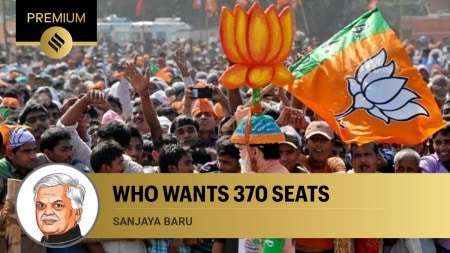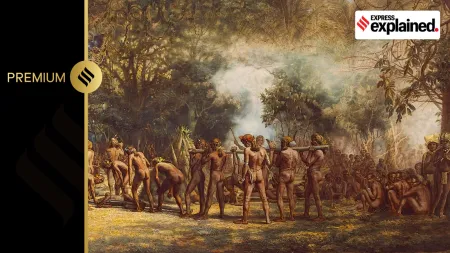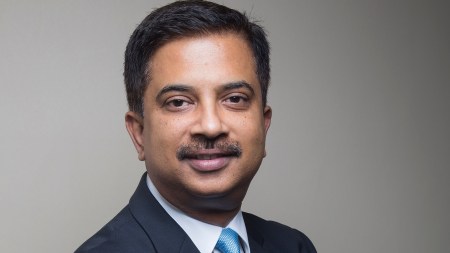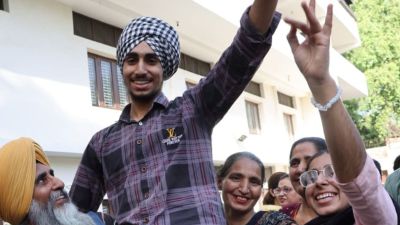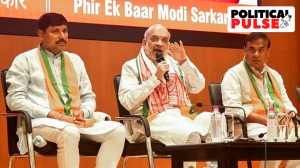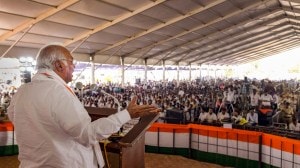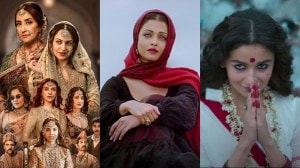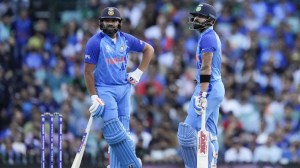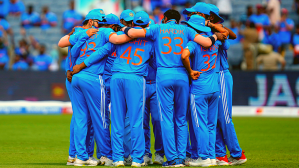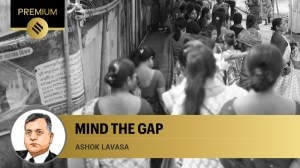- India
- International
Muthuvel Karunanidhi: From failing Class X to changing the social fabric of Tamil Nadu
Despite the multiple allegations against him, no one can take away the legacy he has left behind, be it in terms of the role that cinema and theatre has to play in political and social reform, or in the way, a movement by those in the margins of society could change the social fabric of a state.
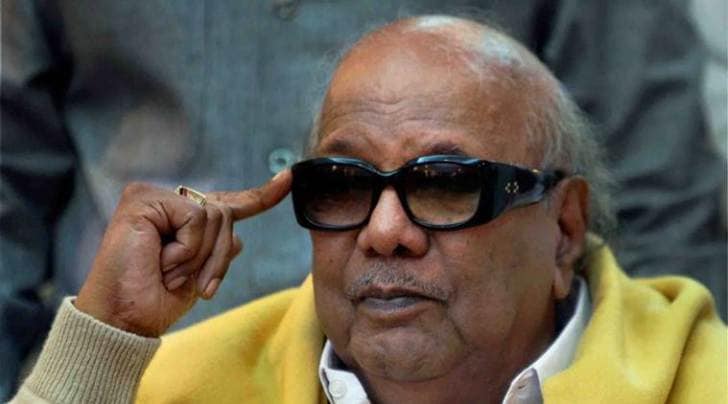 Karunanidhi was born in a small village called Thirukkuvalai situated some 300 kilometers south of Chennai.
Karunanidhi was born in a small village called Thirukkuvalai situated some 300 kilometers south of Chennai.
Tamil Nadu was witnessing a movement of monumental potential in the 1920s and 30s. Social activist E V Ramaswamy, popularly known as Periyar, was actively urging the backward castes to rise up in unison and fight against the caste-system and the oppressive methods of the Brahmins. During this period, in 1924, political leader Muhuvel Karunanidhi was born in a small village called Thirukkuvalai situated some 300 kilometers south of Chennai. He was born into a poor family belonging to the temple-dependent Isai Vellalar caste, who are believed to be part of the Shudra strata in the hierarchical structure of Hindu society.
Growing up in the caste-ridden society of Tamil Nadu in the early decades of 20th century, Karunanidhi was quick to learn the lessons of the crippling conditions that resulted from being born in a low caste. At the tender age of 14, he was already part of Periyar’s self-respect movement, urging the Dravidian community to actively stand up in opposition to the hegemony of the North and that of the Brahmins in the South.
Today, Karunanidhi’s childhood village swells in pride over the mention of the name that went on to dominate Tamil Nadu’s politics in the years to come. Despite facing severe opposition from within the party he went on to join, the number of splits that took place within the party while he was chief and despite all the allegations of corruption, there would be few who would not remark upon the exceptional impact that Karunanidhi made to politics in the South.
The political filmmaker
Before politics though, it is script writing that Karunanidhi first made a name in. After failing in his Class X exams, he moved to Coimbatore to make a living writing scripts for professional theatre groups. However, his style of oratory was quick to impress Periyar who appointed him the editor of the magazine of Dravidar Kazhagam, the party founded by him.

When the Dravidar Kazhagam split into two post-independence, Karunanidhi jointed the splinter group headed by C.N. Annadurai and helped launch the Dravida Munnetra Kazhagam (DMK). By the 1950s, Karunanidhi had become a celebrated script writer and had moved from theatre to films. Politics in Tamil Nadu has for decades shared an intimate relationship with films, even before the DMK was formed. However, it was the DMK that took films seriously as a vehicle of political mobilisation. “The DMK’s involvement in the Tamil film industry is rooted in the Dravidian Movement for non-Brahmin uplift in South India,” writes political scientist Robert L. Hardgrave in his article ‘Politics and film in Tamil Nadu: The stars and the DMK’.
It was through film writers that the DMK made its initial impact. Its founder, Annadurai wrote a number of dramas and films with the aim of bringing about social reform. Karunanidhi followed in his footsteps. In 1952, his film Parasakthi was both well hugely applauded by the audience and critically acclaimed. “My idea was to introduce the ideas and policies of social reform and justice in the films and bring up the status of Tamil language as they were called for in DMK policies,” Karunanidhi is noted to have said in an interview in February 1970. Hardrave writes that the politics of Annadurai and Karunanidhi ushered in a new era in Tamil films.
Karunanidhi, the political challenger
In the 1950s, the Congress still had a stronghold over the Tamil Nadu electorate. However, in the matter of a decade things had changed drastically due to the intense agitations that shook the state in opposition to the imposition of Hindi. In 1967, the DMK became the first non-Congress party to win state elections and the party never managed to return back in power there. The DMK came to power with Annadurai as its chief minister and Karunanidhi became the minister of public works. By now though, the party had reached the conclusion that Dravidian ideology alone could not lead a party to victory and money power was a necessity.
By the late 60s though, frictions within the party were all apparent. When Annadurai passed away in 1969, Karunanidhi managed to climb up the political ladder, surpassing all internal opposition to become the chief of the DMK and also took up the chief ministerial post that was left vacant by the former. Karunanidhi went on to become chief minister of the Tamil Nadu four more times, adding up to almost 20 years in power.
In the early 1970s though the party would undergo another major split when the legendary actor M.G. Ramachandran, left the party on account of being denied a cabinet post among other grievances. Karunanidhi clearly miscalculated the gravity of the situation when he responded by stating “without sacrifice and a party structure, he will achieve nothing”. He would soon regret the statement when MGR with all his massive fan following would form his own party, the AIADMK.
In the first election contested by the AIADMK, the party made a sweeping victory leaving the DMK feeling crushed. They went on to remain in power till the time MGR was alive. It was only after the death of MGR and the split within the party that Karunanidhi managed to spring back to power. The next few years and decades were marked by Karunanidhi and MGR’s successor Jayalalithaa alternating in power in Tamil Nadu and the fierce, almost dirty opposition that existed between the two Dravidian blocs.
Karunanidhi’s life in politics post the 1970s kept the Dravidian movement alive, but it was also marked by the multiple allegations of corruption against him and the various offshoots of his family tree. Soon after MGR broke away from the DMK, he and several members from among his camp submitted several memoranda to the central government citing corruption charges against DMK members. It was only after the promulgation of the Emergency in 1976 that the DMK government was dissolved on charges of corruption.
In 2001, the Sakaria commission indicted Karunanidhi for corruption in allotting tenders for the Veeranam project. The commission had been set up way back in the 1970s after his government had been dissolved and came out with several volumes of reports that charged DMK members of corruption and misuse of power. In 2010, the party also faced allegations regarding the 2G spectrum case when his party was sharing power with the UPA at the centre.
However, in the latter half of his political career the real significance of the DMK monarch in the state lay in the way in which he ensured that Tamil Nadu always had a say in national politics. This was particularly the case since 1996 when he joined the United Front government first led by H.D.Deve Gowda and later by I K Gujral. In April 1999, his party supported the Atal Behari Vajpayee government at a no confidence motion. Though the BJP lost out on the vote, a solid alliance was formed between them and the DMK. The two contested the 1999 general elections together and emerged victorious. Consequently Karunanidhi managed to grab portfolios like petroleum, road, transport and commerce for his party. Soon after though, he withdrew support from the BJP in 2003 and contested the 2004 and 2009 general elections along with Congress in Tamil Nadu. The alliance managed to secure a victory both the times. It was only in 2013 that Karunanidhi withdrew support from the Congress citing the latter’s insensitivity towards Sri Lankan Tamils.
Since 2011, however, the DMK has been out of power with AIADMK retaining its stronghold over the state Assembly. However, at 94, Karunanidhi continued to exercise the same kind of impact over the political spectrum and society of Tamil Nadu. Despite the multiple allegations against him, no one can take away the legacy he has left behind, be it in terms of the role that cinema and theatre has to play in political and social reform, or in the way a movement by those in the margins of society could result in changing the social fabric of a state.
Apr 30: Latest News
- 01
- 02
- 03
- 04
- 05


